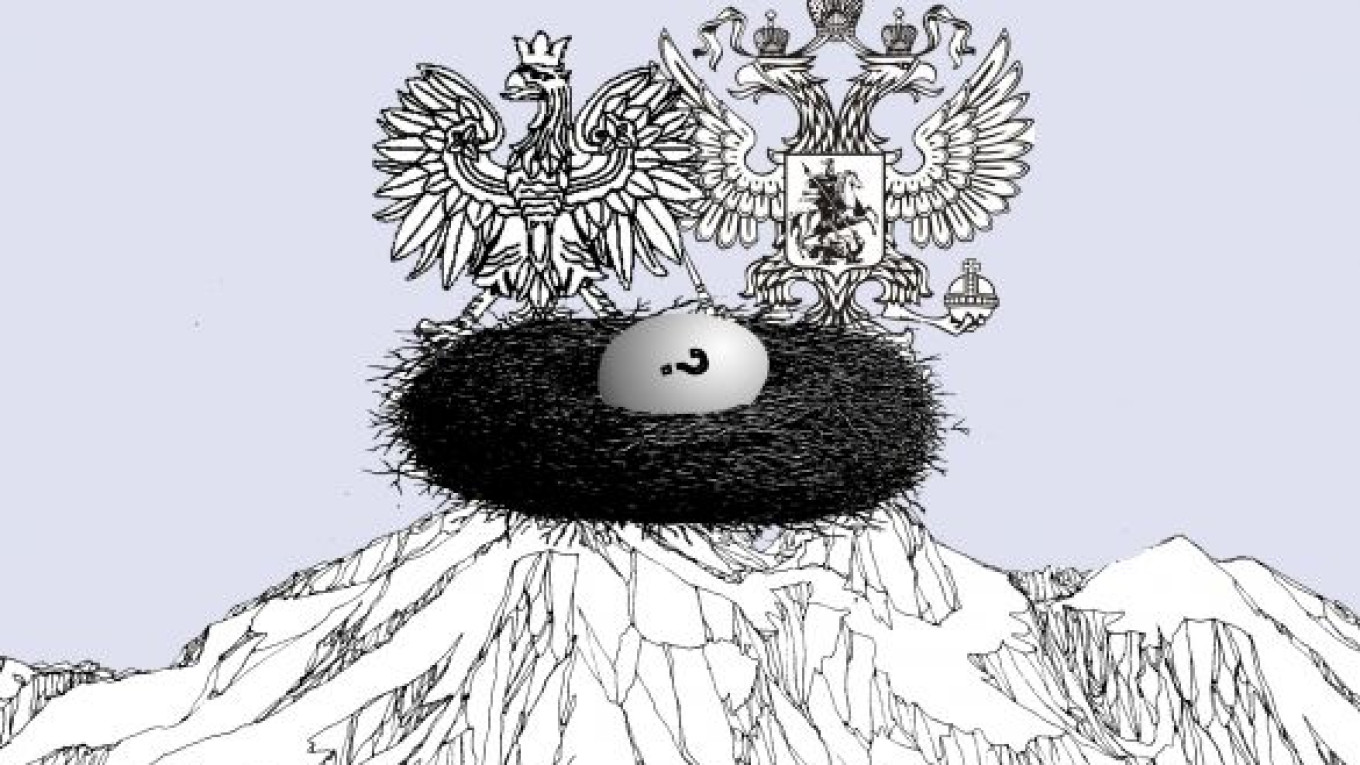A new group was recently organized on Facebook under the title “Polish plane crash should be investigated by the International Commission.” Within days, it ballooned to more than 4,500 members, raising the question of whether people really suspect Russia of being involved in the tragic Polish plane crash of April 10 near Smolensk that killed President Lech Kaczynski and more than 90 high-level officials of the Polish government and parliament.
Russia’s reaction to the crash was quite unusual. It appointed a high-level commission to investigate its causes, headed by Prime Minister Vladimir Putin. Putin also expressed his condolences and has shown every intention of continuing his surprising policy of working with the Poles to expose the full consequences of the massacre of Polish officers at Katyn by the NKVD in 1940. In contrast to other world leaders, President Dmitry Medvedev ignored the problems of volcanic ash and flew to Warsaw for Kaczynski’s funeral on April 17.
The current Russian attitude contrasts with both former Soviet policy, which blamed the shootings on the Nazis, and that of former Soviet and Russian Presidents Mikhail Gorbachev and Boris Yeltsin, who acknowledged Soviet responsibility but did not allow full access to the available archival information.
In other respects, however, the situation is less clear. The Russians had invited Polish Prime Minister Donald Tusk to an earlier commemoration of Katyn, neglecting to offer the same courtesy to Kaczynski, who was known for his conservative, firm stances on Russia — including his efforts to lobby former U.S. President George W. Bush to deploy elements of a missile defense system in Poland, one of the worst sore points in Russian-Polish relations during the Putin years.
While the suggestion that Russia was somehow responsible for the crash is, of course, absurd, such suspicions reflect the recent history of bad blood between the two countries.
From 1795-1918, Poland was virtually wiped off the map when its territories were divided among Russia, Prussia and Austria. After World War I, however, Poland re-emerged as an independent state, and this led to a joint Polish-Ukrainian attack on Soviet Russia in 1919. The new Red Army initially rebuffed the assault and advanced to the gates of Warsaw, intending to expand Communist influence to Poland and central Europe. But the Poles defended their capital successfully and then marched eastward again.
The result was the establishment of a Poland that included a large eastern territory comprised mainly of Ukrainians and Belarussians. The interwar period was a time of barely suppressed venom between Warsaw and Moscow, culminating in the Molotov-Ribbentrop Pact by which Adolf Hitler and Josef Stalin cynically carved up Poland in September 1939.
A brief period of Soviet-Polish conciliation that followed the Nazi invasion of the Soviet Union came to an end with the German discovery in 1943 of the mass graves at Katyn. The Polish government-in-exile in London broke off relations with the Soviet Union, although the Western allies all but ignored the discovery, focusing their efforts on the defeat of Hitler.
In July 1944, the Red Army advanced over the old Soviet border and reached the eastern bank of the Vistula River in Poland. In response, the Polish Home Army in Warsaw mounted an uprising against the German occupants on Aug. 1, believing that external aid would be forthcoming. But not only did the Polish-born General Konstantin Rokossovsky’s army of the First Belorussian Front fail to come to the aid of the Poles, Stalin even prevented the Western allies from dropping supplies to the insurgents from the air.
Subsequently, the Germans massacred the Poles and razed Warsaw. Stalin created the so-called Lublin Committee, which paved the way for the creation of the puppet Communist government in Poland after the end of World War II. Symbolic of Soviet dominance was the Palace of Culture in the center of Warsaw, a hideous “wedding cake” Stalin-era building that is still the tallest building in Poland.
Communist Poland, however, was rarely a tranquil satellite of the Soviet Union. After the death of Stalinist leader Boleslaw Bierut in 1956, an uprising took place in Poznan, but this was suppressed brutally by Rokossovsky, who had been serving as Polish defense minister since 1949.
The era of the Solidarity trade union began in the early 1980s, and the role of the Polish Pope John Paul II in bringing an end to communism not only in Poland but also in Eastern Europe as a whole cannot be underestimated. In 1999, Poland joined NATO, symbolizing the total demise of Russian influence.
Nonetheless, the shocking catastrophe of April 10 offers an opportunity to improve Polish-Russian relations. Tusk, whose Civic Platform party dominates the parliament, can also do a lot to push these efforts from the Polish side. Poland now needs to decide whether this reversal of recent history is genuine and, if so, whether it is mutually beneficial and worth pursuing.
David Marples is a professor in the department of history and classics at the University of Alberta, Canada.
A Message from The Moscow Times:
Dear readers,
We are facing unprecedented challenges. Russia's Prosecutor General's Office has designated The Moscow Times as an "undesirable" organization, criminalizing our work and putting our staff at risk of prosecution. This follows our earlier unjust labeling as a "foreign agent."
These actions are direct attempts to silence independent journalism in Russia. The authorities claim our work "discredits the decisions of the Russian leadership." We see things differently: we strive to provide accurate, unbiased reporting on Russia.
We, the journalists of The Moscow Times, refuse to be silenced. But to continue our work, we need your help.
Your support, no matter how small, makes a world of difference. If you can, please support us monthly starting from just $2. It's quick to set up, and every contribution makes a significant impact.
By supporting The Moscow Times, you're defending open, independent journalism in the face of repression. Thank you for standing with us.
Remind me later.


